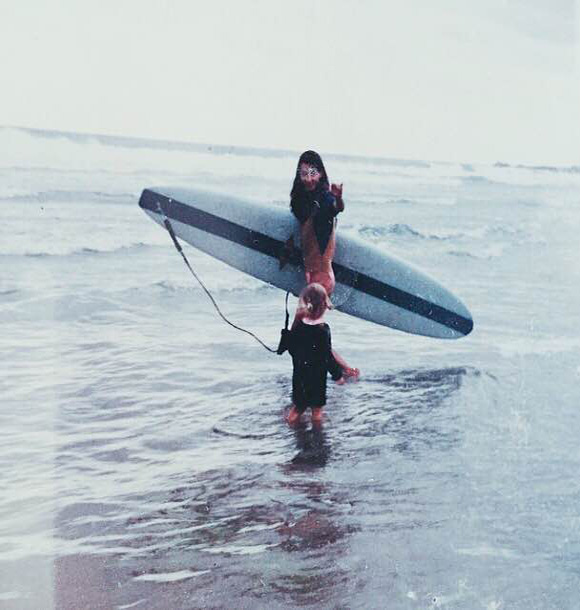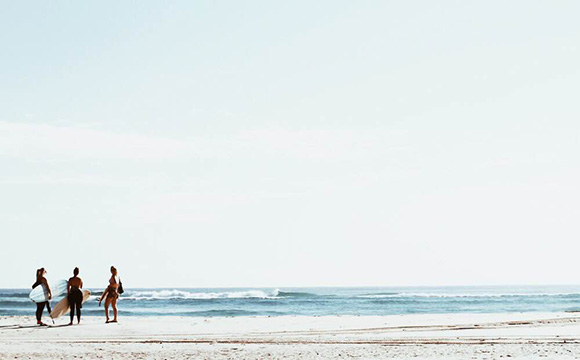5 Steps to Overcoming Injuries
What do you call a surfer who does not surf? A runner who does not run, or a yogi who does not practice yoga?
This post comes from our FP Contributor, Miann Scanlan!
Being a pretty active person, I love my “me” time, especially in the outdoors. I feel very attached to the ritual of bursting out the front door with the sole purpose of getting all sweaty, salty and sandy. I live for the moment my leg-rope is on and the adrenalin of the paddle-out starts to work its way into my chest. Then, once I’m past the break, I relish those quiet moments of solitude between sets – just me, my board, the vast ocean, and my thoughts. Don’t even get me started on that post-surf endorphin rush. The “stoke” aka the dizzying bliss as I lay on the sand after an exhausting surf, when it feels like there’s absolutely nothing left in the tank, replaying wave after blissful wave over in my mind.
At the very beginning of this year, I had it all planned out perfectly.
I’d surf at every waking opportunity, no matter the conditions, in preparation for a surf trip to Sri Lanka this December. I’d complete an intensive boot camp with my trainer to improve my strength, and I’d be able to swim 10k to improve my lung capacity. But a broken nose only 5 days into the new year, and a herniated disc in my spine halfway through made damn sure I wouldn’t achieve my goals. So far I’ve only clocked up a small handful of great surf sessions and, as the year draws to a close, my Sri Lanka dreams shattered, I haven’t felt like myself in a very, very long time.
What I’ve discovered since writing this article on overcoming setbacks, is that the pain of a setback hurts much more than the injury itself.
After all, what do you call a surfer who does not surf?
After coming to terms with my first injury in January, I asked myself how quickly can I fix this and how quickly can my real, uninjured life resume? Lucky for me it wasn’t too long. About a month for my broken nose to heal and I was almost back in the water. But not before the long battle with my newfound fear of the ocean and the surfboard attached to my leg began. Eventually, I sheepishly caught a few waves and when a great swell arrived, I took off for a few weeks to my favourite surf spot to get my confidence and groove back.
That was until one day, standing in my kitchen, my back unexpectedly gave way as my disc herniated and pushed on my spinal cord. I’ve never experienced pain like that. The kind of pain that makes you scream, puts your body into shock and makes you wish you would just pass out. The doctors in emergency couldn’t pinpoint what was wrong and sent me home with pain killers and an order of bed rest. So that’s what I did, and have been doing since. Laying down while the world outside continued on and I felt left far behind…
Months on and I am still out of the water, I can’t practice yoga to feed my soul, go for a run to clear my head, even sit at this chair to write this very article for too long before I have to lay down. I can’t help but feel angry, frustrated, guilty and helpless all at once. But, why is that? Why do these feelings tend to crawl up to the surface?
Through my injuries this year, more than anything I am learning to accept myself as I am, to accept my limitations and to be patient. By accepting yourself as you are, you become closer to loving yourself. However, this is never an easy path when your body is failing you. Here are my 5 steps to overcoming injuries now matter how far along recovery you are:
1) Surrender, let go
I sound like a broken record when I say this, but I believe it with every inch of my being: everything happens for a reason. Whether the reason is apparent or remains a mystery, just trust that there is a bigger and better plan for you. Try this mantra:
Universe grant me the strength to accept the things I cannot change and the courage to change the things I can.
2) Be mindful and present
Living each moment with awareness helps to focus our energy in the present moment and accept it instead of wondering how things could be different. Torturing yourself by thinking about what you could have done to avoid the injury leads you nowhere. Instead, practice mindfulness. It will help you connect with your body and start listening to it. Get to know your here-and-now body. Does it need rest, movement, ice and a warm bowl of soup? Your body right now needs your attention. It’s sending you signals and it’s important you listen to them. Press pause on the daydreams of when you’re back on your feet and just BE with your current, healing body.
3) Use the opportunity to learn
Every injury opens the door for you to learn about your body. I’ve asked my doctors, physical therapists and acupuncturists question after question, so that I can learn how the mechanics of my body really work. An injury is the best anatomy lesson you can have. The knowledge I know now, post-injury, I would never have gathered without it. And now I truly begin to understand, appreciate and feel its intricacies.
Beyond learning about anatomy, the road to recovery is a unique opportunity to learn more about yourself. Personally, I believe my back injury happened sooner rather than later, to help better prepare me for old age. How? By slowing me to a screeching halt, and having to re-train my body and its physical functions completely from scratch. Trust me when I say this, I’m working with a holistic practitioner on how to breathe into my diaphragm to take pressure off my lower back, strengthen my big toes for better balance, coordinate breathing and stepping for balanced energy flow in the body. If I stick with it and apply myself, I know I will come out a better, healthier person.
4) Practise patience
This is definitely the hardest for me. When my team of healers and helpers only recently told me they don’t know if my back will ever heal back to normal, or even when I’ll be able to surf or practice yoga again, there was naturally an initial moment of panic. But then I remembered all of the above, and that injuries are actually one of life’s ultimate tests of patience. If you are not patient, they will never heal. If they never heal, you will never be able to do what you love in the same way. If you are patient, the body will heal itself as it knows how to do best.
5) Don’t lose sight
I’m lucky in that, through my personal social media channels, I have been able to share my experience and connect with many peers in my online community who have experienced the same or similar injury. Everyone tells me it will eventually get better and, even though it’s hard for me to imagine, I’m inspired by their encouragement to never, ever give up.
I straight up refuse to never surf again, and I’ve used that determination as a catalyst to put the extreme care and attention into my recovery. Rather than feeling helpless, I feel empowered knowing I’m doing everything I can. After all, the grass is always greener on the other side of injury.
+How do you take care of injuries? Please share in the comments!
For more from Miann Scanlan, check out her website and Instagram!



